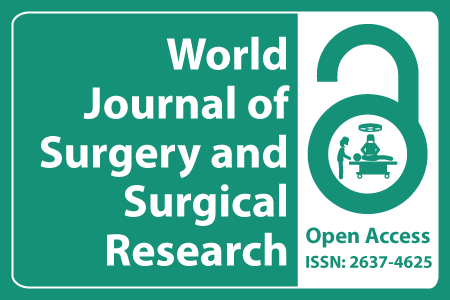
Journal Basic Info
- Impact Factor: 1.989**
- H-Index: 6
- ISSN: 2637-4625
- DOI: 10.25107/2637-4625
Major Scope
- Vascular Surgery
- Colorectal Surgery
- Spine Surgery
- Cardiac Surgery
- Surgery & Surgical Research
- Surgical Procedures
- Gastroenterological Surgery
- Oral & Maxillofacial Surgery
Abstract
Citation: World J Surg Surg Res. 2021;4(1):1342.DOI: 10.25107/2637-4625.1342
Postoperative Sequelae after Esophagectomy for Adenocarcinoma in the Gastroesophageal Junction; an 18 Months Nurse Specialist Outpatient Clinic Follow-Up
Andreas Weise Mucha1*, Laser Arif Bazancir1 , Magnus Skov Joergensen2 , Michael Hareskov Larsen2 and Michael Patrick Achiam1
1Department of Surgery and Transplantation, Rigshospitalet, Copenhagen University Hospital, Denmark 2Department of Surgery, Odense University Hospital, Denmark
*Correspondance to: Andreas Weise Mucha
PDF Full Text Research Article | Open Access
Abstract:
Background and Aims: Patients with Gastroesophageal Junction (GEJ) cancer have a poor prognosis with an overall 5-year survival rate of 10% to 15%. With curative surgery, survival is improved to around 40%, but esophagectomy is an extensive surgical procedure with well-documented impairments that burdens the patients. A substantial weight loss is common, and symptoms such as reflux, dumping, and fatigue are frequently observed. This study aimed to evaluate the extent of postoperative sequela in two high-volume centers. Methods: This study is a retrospective analysis of prospectively registered data from patients who had undergone curative esophagectomy between January 2016 and August 2017. Data were obtained from patients with an 18 months follow-up without recurrence. All of the operations were conducted at two high-volume upper gastrointestinal cancer surgical centers. A nurse specialist outpatient clinic conducted the prospective follow-up interview. Results: 113 persons were included in the analysis. The most common postoperative problems identified were reflux (45%), fatigue (36%), dumping (31%), and dysphagia (21%). Problems with loss of appetite, activities of daily living, and pain were also reported. Most symptoms improved throughout the follow-up period, except for reflux. Six months after the operation, the weight loss leveled out at an average of 90.4% of the preoperative weight, and the patients did not regain their preoperative weight status. Conclusion: The patients initially experienced a postoperative deterioration of all of the symptoms observed, but most improved within 12 months.
Keywords:
Esophageal neoplasms; Dumping syndrome; Adverse effects; Gastroesophageal reflux; Postoperative complications
Cite the Article:
Mucha AW, Bazancir LA, Joergensen MS, Larsen MH, Achiam MP. Postoperative Sequelae after Esophagectomy for Adenocarcinoma in the Gastroesophageal Junction; an 18 Months Nurse Specialist Outpatient Clinic Follow-Up. World J Surg Surgical Res. 2021; 4: 1342..













